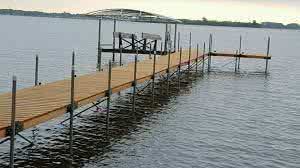Betekenis van het woord dock in het Nederlands
Wat betekent dock in het Engels? Ontdek de betekenis, uitspraak en specifiek gebruik van dit woord met Lingoland
dock
US /dɑːk/
UK /dɑːk/

Zelfstandig Naamwoord
1.
dok, kade, pier
a platform built out from the shore into water and supported by piles; used as a landing place for ships and boats or for loading and unloading cargo
Voorbeeld:
•
The ship pulled up to the dock to unload its goods.
Het schip meerde aan de kade om zijn goederen te lossen.
•
We walked along the dock, enjoying the sea breeze.
We liepen langs de pier, genietend van de zeebries.
2.
beklaagdenbank, getuigenbank
the part of a court where the accused sits or stands
Voorbeeld:
•
The defendant stood nervously in the dock.
De beklaagde stond nerveus in de beklaagdenbank.
•
He was led to the dock to face the judge.
Hij werd naar de beklaagdenbank geleid om de rechter onder ogen te zien.
Synoniem:
Werkwoord
1.
2.
korting, aftrekken
to deduct (an amount) from someone's wages
Voorbeeld:
•
The company decided to dock his pay for being late.
Het bedrijf besloot zijn loon te korting vanwege zijn te laat komen.
•
They will dock your pay if you don't complete the task on time.
Ze zullen je loon korting als je de taak niet op tijd voltooit.
3.
kortwieken, staart couperen
to cut short (an animal's tail)
Voorbeeld:
•
Farmers used to dock the tails of their sheep.
Boeren kortten vroeger de staarten van hun schapen.
•
It is illegal in some places to dock a dog's tail.
Het is op sommige plaatsen illegaal om de staart van een hond te kortwieken.
Leer dit woord op Lingoland